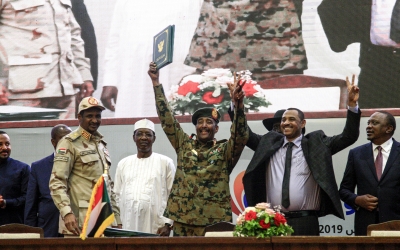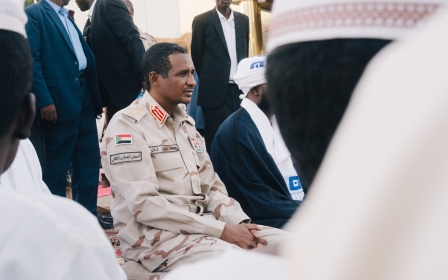Sudanese factions agree on members of 11-seat ruling council

Sudan's main opposition coalition and leading generals have formed a governing council that will head the country during its three-year transition to civilian rule, a spokesman said.
The members of the 11-seat council were agreed upon on Tuesday, according to a spokesman for the Transitional Military Council (TMC), Reuters news agency reported.
New MEE newsletter: Jerusalem Dispatch
Sign up to get the latest insights and analysis on Israel-Palestine, alongside Turkey Unpacked and other MEE newsletters
Members of the sovereign council and the prime minister will be sworn in on Wednesday, the news agency said.
According to an agreement drawn up at the start of the month, the opposition coalition was set to choose five members of the council and the military another five, while the two sides jointly choose a civilian as an eleventh member.
The names of those chosen for the 11 seats on Tuesday were not immediately made public.
The agreement also provides for a 300-member legislative assembly to serve during the transitional period and a cabinet of technocrats, Reuters reported.
The council will be led by Lieutenant General Abdel Fattah al-Burhan, who is the head of the TMC, the agency said.
The TMC, a group of military generals, took charge of the country in April after longtime ruler Omar al-Bashir was forced from power.
But opposition protest leaders continued demonstrations for months after Bashir's ousting, demanding civilian rule.
Last week, Sudan's main opposition alliance nominated economist Abdalla Hamdok to serve as prime minister in the country's transitional government.
A power-sharing agreement signed on Saturday paved the way for a transitional government and eventual elections.
It established a sovereign council as the highest authority in the country, but largely delegates executive powers to the cabinet of ministers.
The new ruling council is set to govern for a 39-month transitional period to civilian rule, of which the first 21 will be military-led. But the deal has faced criticism from protesters who feel the army may renege on their promises.
The new government will be expected to tackle a crumbling economy that was the impetus for the protests against Bashir's rule.
Middle East Eye delivers independent and unrivalled coverage and analysis of the Middle East, North Africa and beyond. To learn more about republishing this content and the associated fees, please fill out this form. More about MEE can be found here.





